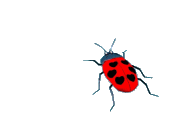THAT'S NEW TO ME 4 & 5!
Digger wasps are cosmopolitan predators that can sting and paralyze prey insects. In preparation for egg laying they construct a protected "nest" (some species dig nests in the ground, while others use pre-existing holes) and then stock it with captured insects. Typically the prey are left alive, but paralyzed by wasp toxins. The wasps lay their eggs in the provisioned nest. When the wasp larvae hatch, they feed on the paralyzed insects. A well-known species of digger wasp is the great golden digger (Sphex ichneumoneus) which is found in North America. The developing wasps spend the winter in their nest. When the new generation of adults emerge, they contain the genetically-programmed behaviors that are required to carry out another season of nest building. During the summer, a female might build as many as half a dozen nests, each with several compartments for her eggs. The building and provisioning of the nests takes place in a stereotypical, step-by-step fashion.

Asclepia L., the milkweed,is a herbaceous that contains over 140 known species and is classified as part of the dogbane family. Milkweeds are an important nectar source for bees and other nectar seeking insects, and a larval food source for monarch butterflies and their relatives, as well as a variety of other herbivorous insects specialized to feed on the plants despite their chemical defenses. Milkweed is named for its milky juice and some species are known to be toxic. Strangely enough though Carolus Linnaeus named the genus after Asclepius, the Greek god of healing, because of the many folk-medicinal uses for the milkweed plants.
As I read this information I thought "this reminds me so much of Euphorbia" and sure enough when I looked at the botanical "class"(Magnoliopsida) and "division" they were same....a bit like having the same great grandparents but developing your own characteristics.
I'm not exactly sure which form of Ascepia W.o.t.V had but this is a photo of one that truly proves what a nectar bar it is.
 Speaking of insects....I took a photo of this bee in our garden yesterday afternoon....I'm not sure if it is trying to build a nest, the hole is really small and in the concrete post of the fence....I think it more likely it was sheltering from the weather....................
Speaking of insects....I took a photo of this bee in our garden yesterday afternoon....I'm not sure if it is trying to build a nest, the hole is really small and in the concrete post of the fence....I think it more likely it was sheltering from the weather.................... and with black skies like this looming I'm not surprised!
and with black skies like this looming I'm not surprised!

I did say at the beginning of June that I'd take regular photos of the garden from one particular angle just to see how it changes......
FEBRUARY
JULY 4TH
Despite the unseasonal weather everything is still growing and I hear from the weatherman that things may be set to improve!!





























11 comments:
I hope that things will get better on the weather front, they can hardly get any worse. Those dark skies look awful familiar to me. Good grief, first we had Summer in April and now we have Autumn in June/July. Whatever next?
Love the pics of the garden, those of the creepy crawlies less so. I wonder why? ;-)
Yolande; we have been promised fair weather this weekend...followed by MORE RAIN next week! As for the creepy crawlies...I'm gaining a new respect for them since I've been taking more photos and many of them do help the garden. Though I wasn't very happy when I got stung by a wasp a few days ago :o)
Hi Ruth ~~ Nasty little wasp, but isn't nature wonderful - how they provide the food for their young.
The skies sure do look grey. We had some rain today. There were bad storms and floods last week on the southern coast of Victoria. Poor people would finally get back (after evacuation) to a muddy mess with things ruined. Thanks for your kind words about the things I post. Hope I can get photos on shortly. Take care, Ruth. Love, Merle.
I can't wait for the sun to shine for longer than a ew hours. Your garden is fab Ruth, you're such an inspiration to us novices x x x
Merle; I'm glad the storms didn't affect you too much
Shaz; I'm still a novice in many ways...half the thrill is never knowing it all and still finding things to learn.
I wouldn't be able to name any insects for you Ruth I can just distinguish between Wasps and Bees! I'll send you some sun from Egypt. x
A novice!?! Oh no, Ruth you are way more than that...you have such a wonderful amount of knowledge! You're my very own garden encyclopedia! ;o) {{HUGS}} x
I guess that means you can read me like a book...lol
cute avatar Talj! :o)
hang on Ruth aren't those honey bees?
if so i'd get in touch with a beekeeper bc in late summer (far as I recall from primary school) a situation arises with 2 queens in the hive and many workers will follow the new queen. when this happens an experienced beekeeper will be able to fish down the swarm from wherever it goes (probably up a tree) and might even pay you for the bees... or you could take up beekeeping yourself
they do look like normal honeybees... years ago i was interested in keeping them (in my teens) so i only know a little more than average
it's unusual for bumblebees to live in an obvious burrow like that ... honeybee colonies are akin to wasps' nests so be a bit careful!
but surely it's late in the year for them to be actually setting up a colony ... and too early to have swarmed?
ooer i don't know!
... or was i getting the wrong end of the stick?... i bet i was!
one bee in hole... lots of bees in flowers ... new home... i don't know
anyway those cloud piccs were "lovely" in a please don't rain on me kinda way ...
Ruth oops,
Thanks for the nice music, that cheered me up, the skies are as dark at your place as they are here in Holland, and its summer!!!
Sorry I am very bad in names of insects, did you try to google them?
Wanna see Dutch dark skies? Visit my blog, we can bet which one is the darkest haha!!
I wish you a sunny positif mood!
Sunny greetings JoAnn
Post a Comment